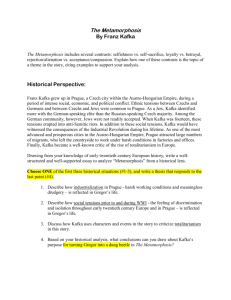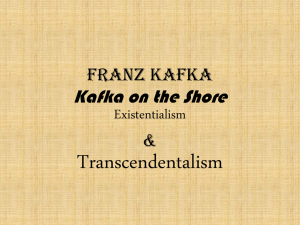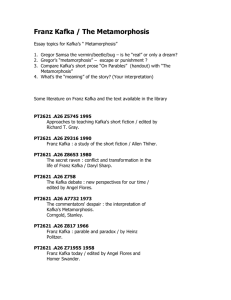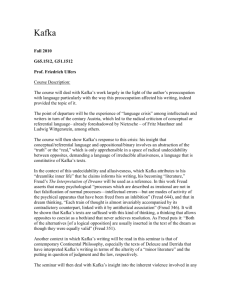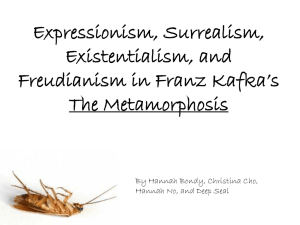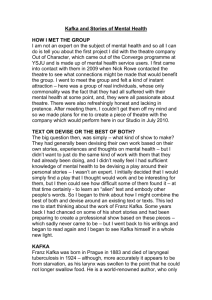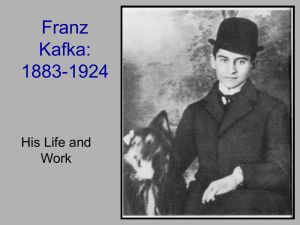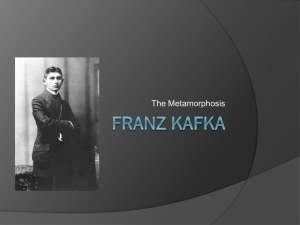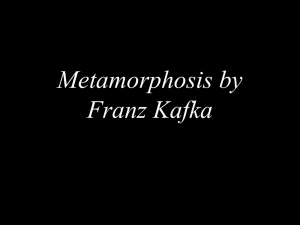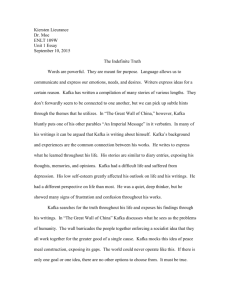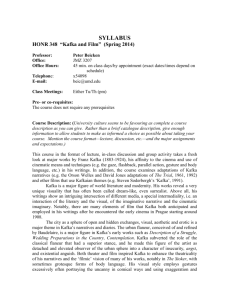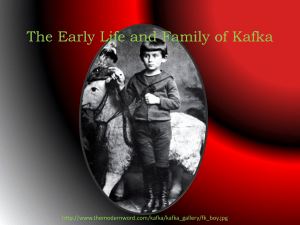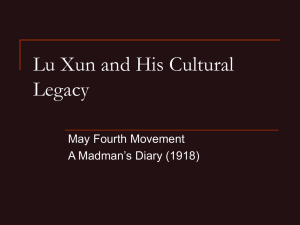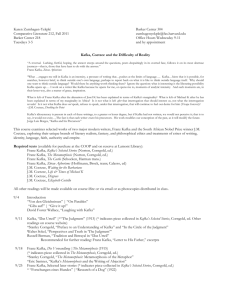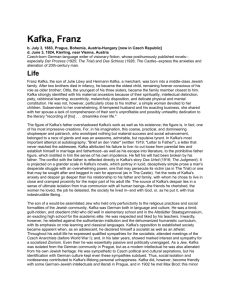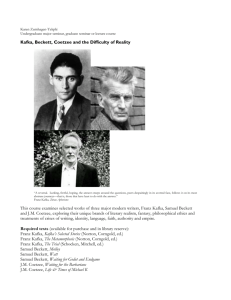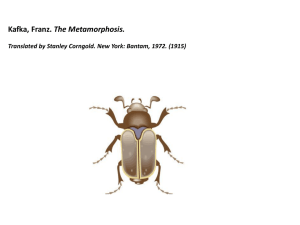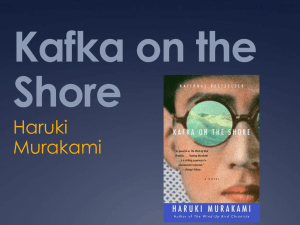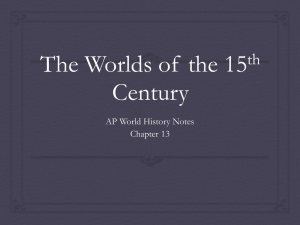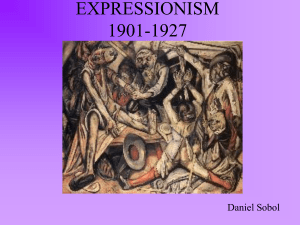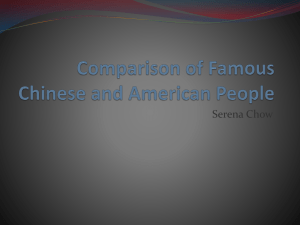Lu Xun and Franz Kafka
advertisement
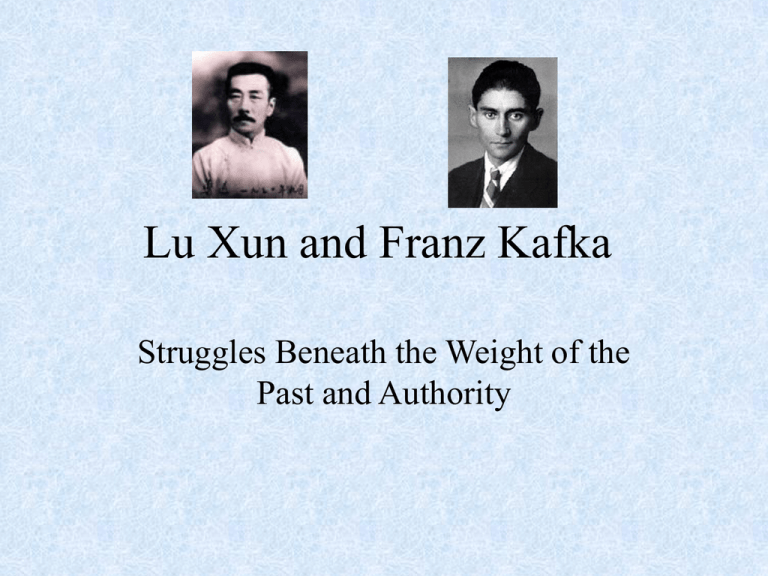
Lu Xun and Franz Kafka Struggles Beneath the Weight of the Past and Authority In spite of their differences, Kafka and Lu Xun share a common concern on what they saw as the oppressive nature of the past and the authority drawn from it. Lu Xun or Lu Hsün • He originally studied to be a doctor, Lu Hsün became associated with the nascent Chinese literary movement in 1918. • Lu tells of seeing a slide of a Chinese prisoner about to be decapitated as a Russian spy. – What shocked the young medical student was the apathetic crowd of Chinese onlookers, gathered around to watch the execution. At that moment he decided that it was their dulled spirits rather than their bodies that were in need of healing. • Lu Xun's works exerted a very substantial influence after the May Fourth Movement to such a point that he was lionized by the Communist regime after 1949. • Mao Zedong himself was a lifelong admirer of Lu Xun's works. Though highly sympathetic of the Chinese Communist movement, Lu Xun himself never joined the Chinese Communist Party despite being a staunch socialist as he professed in his works. Of course that did not stop the Chinese Communist government from using his reputation. His wish to discard the past worked perfectly with the idea of the people’s revolution. “Diary of a Madman” • Modeled after Nikolay Gogol's tale of the same title, the story is a condemnation of traditional Confucian culture which the madman narrator sees as a “man-eating” society. • Friends within the newly formed Chinese literary movement in 1918 urged him to publish the short story “A Madman's Diary.” • It was the first Western-style story written wholly in Chinese, it was a tour de force that attracted immediate attention and helped gain acceptance for the short-story form as an effective literary vehicle. • “Madman” opens with; a preface in mannered classical Chinese, giving an account of the discovery of the diary. • Such ironic use of classical Chinese to suggest a falsely polite world of social appearances was quite common in traditional Chinese fiction; but its presence usually suggested the alternative possibility of immediate, direct, and genuine language, a language of the heart set against a language of society (Norton 1919). • Although utterly mad, the writer’s claims when looked at in a metaphoric manner in face make snese. • As the diary progresses, it becomes increasingly clear that the diarist, who sees himself as the potential victim, is no less the, mirror of the society he describes, assimilating everyone around him into his own fixed view of the world. The reading of ancient texts to discover evidence of cannibalism is a parody of traditional Confucian scholarship, the distorting discovery of "secret meanings" that only serve to confirm beliefs already held. • His is a world entirely closed in on itself, one that survives by feeding on itself and its young--a voracity that gives Lu his famous last line, "Save the children“ (Norton 1919). Upstairs in a Wineshop • Your Norton text says that “In contrast to the tormented, diarist of Diary of a Madman, the characters in Upstairs in a Wineshop have already been eaten and fully digested.” • Thus he is already caught in the meaningless pressures of a life controlled by family and cultural traditions. • “Upstairs” is a bleak tale of deaths and wasted lives. The narrator's friend, after grand hopes in his youth finds himself back in his hometown, going through the hollow motions of filial duty, • Caring for the family graves was an act that had great resonance in Confucian family ritual. • To put to rest the worries of his mother, who has heard that the nearby riverbank is encroaching on the grave site, the friend has come to rebury his younger brother, whom he barely remembers. • On digging up the grave, he finds that there is nothing left of his brother's body. • Nevertheless, having bought' a new coffin, he puts some dirt from the old grave in it, reburying it beside his father in a different graveyard arid enclosing it in. bricks for a better seal; As the friend says, ""At least I've done enough to pull the Wool over Mother's eyes and set her mind at rest." • Even when the past has lost all meaning, leaving neither physical remains nor memory, the narrator's friend still finds himself trapped by its forms, which he carries out scrupulously, moving a grave site to protect a body that no longer exists. Franz Kafka • Kafka was born into cultural alienation: Jewish (though not truly part of the Jewish community) in Catholic Bohemia, son: of a German-speaking' shopkeeper when German was the language of the imposed Austro-Hungarian government, and drawn to literature when his father—a domineering, self-made man— pushed him toward success inbusiness. • His father, Hermann Kafka (1852– 1931), was described as a "huge, selfish, overbearing businessman" and by Kafka himself as "a true Kafka in strength, health, appetite, loudness of voice, eloquence, selfsatisfaction, worldly dominance, endurance, presence of mind, [and] knowledge of human nature.“ • Apparently he resented his father's overbearing nature and feeling deprived of maternal love, he nonetheless lived with his parents for most of his life • In spite of this sense of alienation Kafka was in many ways historically a very positive figure. • He impressed others with his boyish, neat, and austere good looks, a quiet and cool demeanor, obvious intelligence and dry sense of humor. • Furthermore while most American students find especially The Metamorphosis grim reading, Kafka and his friends thought that portions of The Metamorphosis were hysterically funny. • After a vigorous education Kafka took a degree in law to. qualify himself for a position in a large accident-insurance corporation, where he worked until illness forced his retirement in 1922. Kafka’s Inner life • Although he took his writing very seriously, it was achieved while also maintaining this other respected life. • Despite the indubitable fact that Franz Kafka became a respected senior executive handling claims, litigations, public relations, and his institute's annual reports and was one of the few top German executives retained when Czechoslovakia came into existence in 1918, his image in the modern imagination is derived from the portraits of inner languish given in his fiction, diaries, and letters. • This "Kafka" is a tormented and sensitive soul, guiltily resentful of his job in a giant bureaucracy, unable to free himself from his family or to cope with the demands of love, physically feeble, and constantly beset by feelings of inferiority and doom in an existence whose laws he can never quite understand.. • The Law that governs our existence is all-powerful but irrational; at least it is not to be understood: by its human suppliants, a lesson that Kafka could have derived equally well from his readings in, the Danish philosopher Søren Kierkegaard, in Friedrich Nietzsche, or in the Jewish Talmud. • The predicament of Franz Kafka's writing is, for many, the predicament of modern civilization.• As noted earlier he is like Lu Xun in that he resents the institutional systems which make claims upon the individual. • However, identifying that system as bureaucracy, family, religion, language, or the invisible network of social habit is less important than recognizing the protagonists' bewilderment at being placed in impossible situations. Kafka’s “Heros” • Nowhere is the anxiety and alienation of twentieth-century society more visible than in his stories of individuals struggling to prevail against a vast, meaningless, and apparently hostile system. • Kafka's heroes are driven to find answers in an unresponsive world, and they are required to act according to incomprehensible rules administered by an inaccessible authority. • Thus it is small wonder that they fluctuate between fear, hope, anger, resignation, and despair. Kafka's fictional world has long fascinated contemporary writers, who find in it an extraordinary blend of prosaic realism and nightmarish, infinitely interpretable symbolism. • Whether evoking the multilayered bureaucracy of the modern state, the sense of guilt felt by those facing the accusations of authority, or the vulnerability of characters who cannot make themselves understood, • Kafka's descriptions are believable because of their scrupulous attention to detail: the flea on a fur collar, the dust under an unmade bed, the creases and yellowing of an old newspaper, or the helplessness of a beetle turned upside down. • The sheer ordinariness of these details grounds the entire narrative, giving the reader a continuing expectation of reality even when events escape all logic and the situation is at its most hallucinatory. • This paradoxical combination has appealed to a range of contemporary writers—-each quite different from the other—who have read and absorbed Kafka's lesson: Samuel Beckett, Harold Pinter; Alain Robbe-Grillet* Gabriel Garcia Marquez. (Norton 1996-1998) The Metamorphosis • The story of a traveling salesman, Gregor Samsa, waking to find himself transformed into a "monstrous vermin.“ • Scholars have noted the similarity in structure of Samsa’s name to Kafka’s (especially note the placement or the “a” • Also while it is common for us to think of Gregor as being a cockroach, Kafka seems to have purposely made that a vague point—he is an “unclean thing” an unclean animal (or any entity) unsuitable for sacrifice. Ungeziefer also denotes a sense of separation between him and his environment: he is unclean and therefore he shall be excluded. • As some commentators have noted, The Metamorphosis begins with what should be its climax. The protagonist's great transformation, often the pivotal moment in a work of fiction, gets plopped unceremoniously on our lap in the story's first sentence. • No buildup, no tension, just boom: Gregor Samsa is now a bug, and we must all deal with the consequences of this fact. The remainder of the story marks his ineluctable drift into oblivion, with very few surprises along the way. • But no other surprises are necessary. That first simple, declarative sentence and the clear prose that follows it have unleashed a truly staggering torrent of criticism. • Metamorphosis has been interpreted in many ways. Certainly with the way that Herr and Frau Samsa first use Gregor and then make plans to use his sister Greta tie in to Lu Xun's works of the other generation “eating their young.” There is also a strong connection to how a family deals with the long illness of a family member including resentment and release when the “loved one finally dies.” • As noted in Sparknotes “The interpretations seem endless, and endlessly possible (if variously plausible). The psychoanalysts, the Marxists, the Symbolists, the New Critics, the biographers--all have thrown their well-worn hats into the ring. The ability of the story to support so many divergent formulations of its "meaning" is clearly one of The Metamorphosis's most salient features.” This is Funny? • As noted earlier “When Kafka read the story to his circle of companions in Prague, they laughed out loud--as did he.” • Certainly part of the effect of Gregor's transformation is that we are for a moment blinded to the absurdities of the other characters, such as his manager turning up to get him out of bed because he is late. And there is Gergor’s own attempts to continue life as usual almost trying to ignore the complete change in his condition. • As noted on Sparknotes “This is certainly a stark brand of comedy, but laughter has long been a way of coping with life's absurd afflictions. ”
